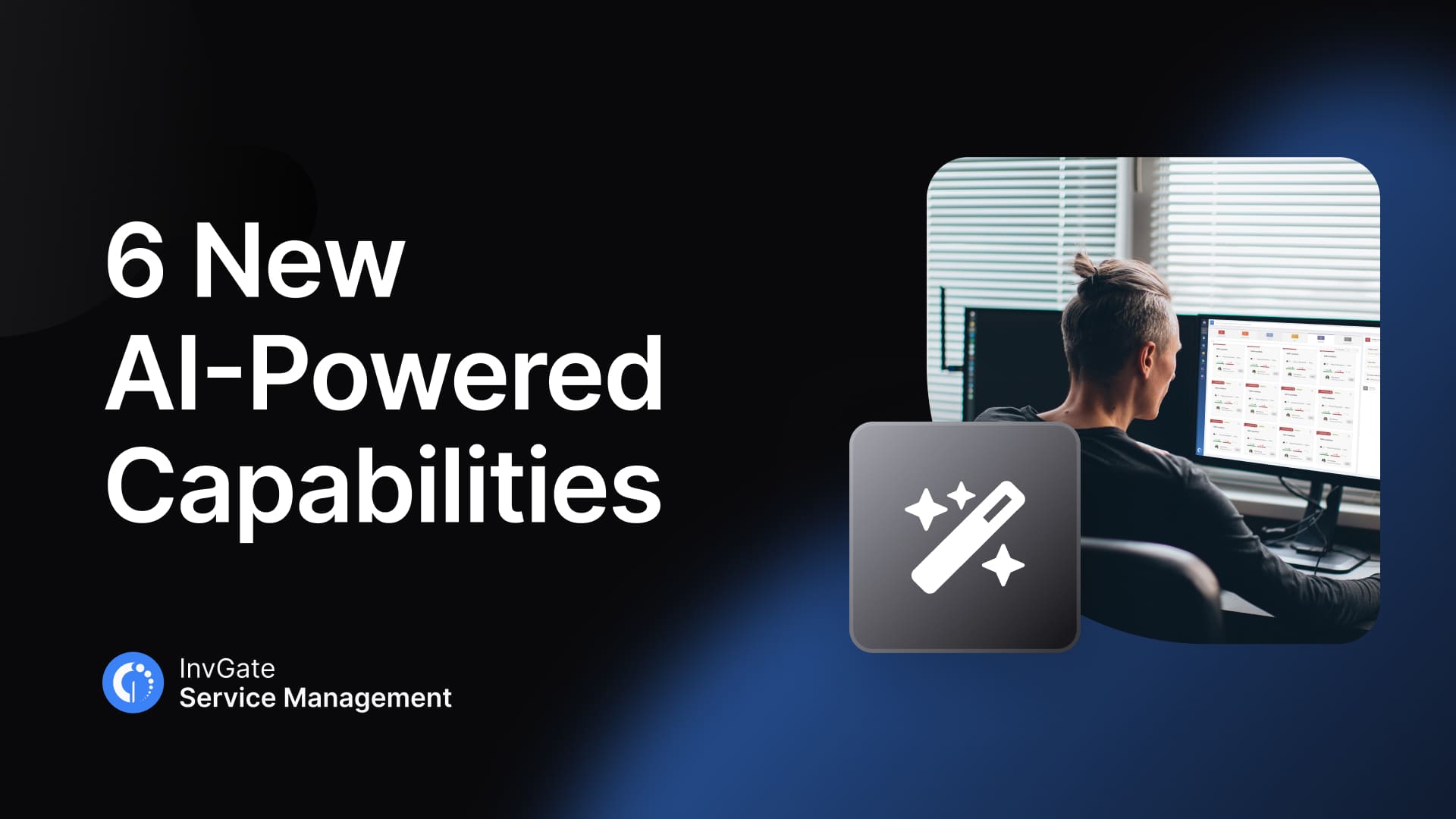Using AI for Incident Management is one of the most popular applications of predictive analytics and automation in ITSM. A recent study found that adoption of AI-assisted incident response grew by 21%, with 63% of organizations already using it and another 34% planning to do so.
In formal terms, Incident Management refers to the process of identifying, analyzing, and resolving events that disrupt or might disrupt normal IT service operations. The goal is to restore services quickly and reduce the business impact.
So, how does AI fit into Incident Management? In this article, we'll guide you through how AI can be used in Incident Management, what it brings to the table, and what to consider before integrating it into your organization’s ITSM strategy.
How can AI be used in Incident Management?
AI can be introduced into incident management in several practical ways. Let’s go through them step by step.
-
Early detection and intelligent monitoring: AI systems process large volumes of logs, events, and metrics in real time. They can spot anomalies indicating an incident before it fully occurs —for instance, a sudden spike in response times or an unusual error pattern triggering an alert.
-
Automatic prioritization and categorization: Once an anomaly is detected, AI can classify it (e.g., high, medium, or low severity), assign tags, suggest the responsible team, and determine urgency. This helps responders act faster without manual sorting.
-
Routing and resolution suggestions: Based on previous incidents, AI can recommend the best resolution path, automatically create tickets, assign resources, and notify the right stakeholders. This reduces delays and human intervention.
-
Root cause analysis and continuous learning: After resolution, AI can analyze logs and incident histories to identify recurring patterns. One academic study processing 100,000 cloud incidents showed a 49.7% improvement in identifying root causes.
-
Automated responses and mitigation: In advanced setups, AI can even execute predefined actions — such as isolating a service, restarting a process, or escalating automatically. According to a recent report, organizations using AI and automation reduce containment time by up to 40%.
Each of these steps improves the team’s ability to react quickly and consistently. However, success depends on how well AI is integrated into existing workflows, how reliable the data is, and how closely it’s supervised.
Benefits of AI-enabled Incident Management
Organizations often see several benefits when they integrate AI into their Incident Management process, such as:
-
Reduced mean time to resolution (MTTR): Automating Incident Management through detection, prioritization, and routing can significantly shorten resolution times. Some studies show time reductions of up to 50% when AI is applied effectively.
-
Lighter workload for IT teams: AI offloads repetitive tasks such as alert triage or ticket creation, freeing analysts to focus on higher-value problem-solving or process improvements.
-
Improved accuracy and fewer false positives: Machine learning models identify subtle patterns that humans might miss, filtering out noise and reducing alert fatigue.
-
Proactive Incident Management: Predictive analysis allows teams to spot trends that might lead to outages or performance degradation before they happen.
-
Continuous improvement through learning: Each incident becomes data for better predictions. Over time, the system refines its recommendations and improves the organization’s overall response maturity.
Challenges of AI-powered incident management
Adopting AI is not without challenges. Below are several key issues organizations often face.
-
Data quality and volume: AI models rely on complete, clean, and well-classified data. If your incident records are inconsistent or sparse, the system may misclassify events or produce unreliable results.
-
Integration with existing workflows and teams: Adding AI requires rethinking how people and automation interact —what gets automated, who supervises outcomes, and how the system communicates with human agents. Without clear roles, confusion or resistance may arise.
-
Trust, transparency, and governance: Teams may hesitate to rely on AI if they don’t understand its reasoning. There’s also a risk of bias or hidden errors. The OECD reports a rise in AI-related incidents, highlighting the importance of documentation and oversight.
7 ways to use AI for incident management
Integrating AI into incident management doesn’t mean automating everything overnight. It’s about identifying the parts of the process that can benefit from intelligent assistance — faster detection, better prioritization, accurate routing, or richer context for resolution. The following approaches are a practical roadmap to introduce AI in phases, starting small and building maturity over time.
1. Early detection and intelligent monitoring
AI can process large volumes of service data, such as logs, metrics, and events, to identify irregular behavior that might indicate a future incident. Instead of relying solely on static thresholds, AI models learn what “normal” performance looks like and detect anomalies in real time.
To begin, select one critical service and consolidate its monitoring data. Train or enable anomaly detection on a few key metrics — for example, error rates, latency, or resource usage. Review alerts for accuracy and adjust parameters before expanding coverage.
When done well, this approach shortens detection time and helps prevent widespread service impact.
2. Alert correlation and noise reduction
During outages, IT teams often receive hundreds of related alerts that describe the same underlying issue. AI can group these alerts into a single incident by identifying shared attributes such as timing, affected components, or error patterns.
Start by analyzing your most frequent alert types and define what makes them related — same service, same dependency, same timestamp window. Then, configure correlation rules or models that automatically cluster similar alerts. Review merged incidents for a few weeks to verify that the AI isn’t overlooking important variations.
Reducing alert noise builds trust among responders and allows them to focus on real problems rather than repetitive notifications.
3. Automated triage and ticket creation
AI can classify incidents by type, severity, or affected service, and even create tickets with pre-filled details. This minimizes manual entry and allows faster categorization. Some ITSM tools include AI capabilities to automatically label new incidents, assign priority levels, or route them to the correct queue based on historical data.
When implementing this, start with non-critical categories. For example, let the AI pre-fill severity and affected service, but require human review before the ticket moves forward. Gradually, as accuracy improves, you can expand to more complex cases.
4. Intelligent routing and escalation
Routing incidents to the right team can be time-consuming, especially in large organizations. AI can analyze previous tickets and resolution times to predict which group is best suited to handle a new issue. Over time, the system learns from each reassignment to refine its decisions.
To apply this, review historical ticket data to identify who typically resolves each service area and what their response times look like. Configure AI-based routing that suggests the most appropriate assignee based on these patterns. Keep human approval in place until the system proves reliable. This step alone can reduce delays and response bottlenecks.
5. Runbook recommendations and guided troubleshooting
AI can assist during the investigation phase by suggesting diagnostic steps or known resolutions based on similar past incidents. For example, when a recurring service issue arises, the system can display the most relevant runbook or knowledge article right within the ticket.
To start, make sure your documentation is searchable and consistently tagged. Connect your knowledge base with incident data so that context — such as affected service or symptom description — helps surface the right articles. Review the AI’s recommendations periodically and flag missing content for improvement. Over time, this creates a self-improving feedback loop between your knowledge base and real incidents.
6. AI-generated incident summaries and context gathering
During an ongoing incident, responders spend time piecing together what happened, when, and who’s affected. AI can automatically summarize related tickets, alerts, and system data to produce a concise report or update for the response team.
To make this work, integrate your monitoring, ticketing, and Change Management systems so that all relevant information is accessible.
AI can then assemble timelines, identify the most frequent contributing factors, and even generate short status updates. Always review summaries for accuracy before sharing them with stakeholders. The payoff is faster situational awareness and better communication during crises.
7. Root cause analysis and trend identification
After resolution, AI can examine incident records, logs, and historical patterns to help identify recurring causes. It can cluster incidents that share symptoms or dependencies, helping teams detect systemic issues like faulty configurations or aging hardware.
Start by tagging incident records consistently and feeding them into your analytics pipeline. Review clusters or trends manually to confirm accuracy, and use findings to update monitoring rules or preventive maintenance plans.

Using InvGate Service Management as your AI Incident Management software
InvGate Service Management applies AI to Incident Management by automating key processes that help IT teams detect, classify, and respond to issues more efficiently.
One of its core features, major incident detection, analyzes reported incidents to identify patterns that could indicate a larger issue. When a potential major incident is detected, the system alerts help desk coordinators, allowing them to act quickly and prevent disruptions.
Other AI-powered capabilities within InvGate Service Management focus on areas that directly impact Incident Management. Common problem detection, for example, supports Problem Management by identifying recurring issues and analyzing their root causes. Addressing these problems early reduces the number of incidents IT teams need to handle, making overall Service Management more efficient.
Similarly, the predictive risk and impact analysis focuses on evaluating change requests before they are implemented. While this is part of Risk Management rather than Incident Management, it directly affects incident prevention. AI can evaluate historical data to predict potential disruptions and reduce the likelihood of incidents caused by poorly planned changes. It helps IT teams anticipate possible disruptions and make better decisions.
With these AI-driven features, InvGate Service Management strengthens incident response and helps IT teams focus on long-term improvements instead of constantly addressing recurring issues.
Get started with a free trial to see it in action!















.jpg?upsize=true&upscale=true&width=780&height=205&name=how-to-create-a-service-level-agreement%20(1).jpg)
